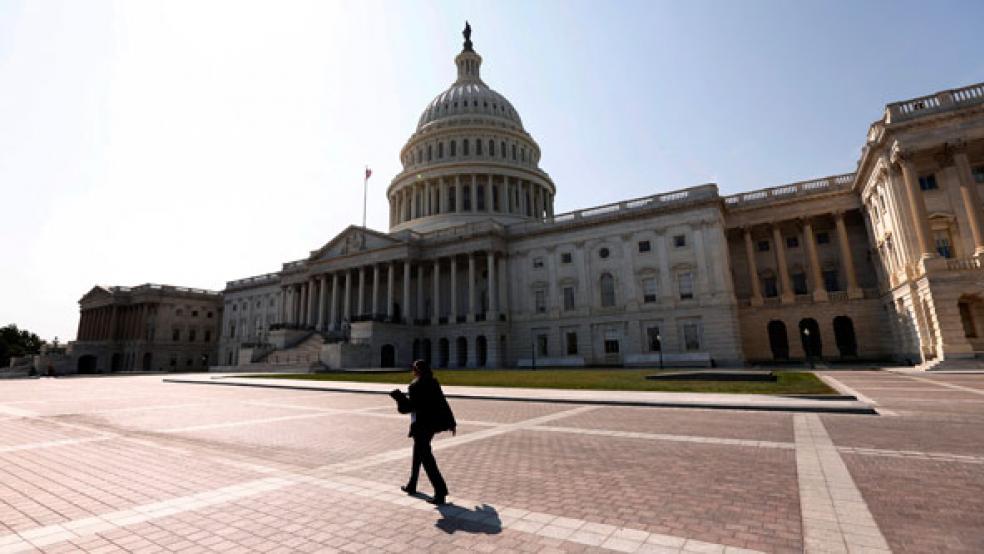When Indiana Republican Senate candidate Richard Mourdock declared earlier this week that “life is a gift from God,” even when conceived in that “horrible situation of rape, it's something God intended," it was another reminder of just how snake-bit the GOP’s once promising prospects are for taking back control of the Senate in November.

The arch conservative state treasurer toppled veteran Republican senator Richard Lugar in the primary, with a lot of help from the Tea Party. But his highly partisan, my-way-or-the high way bluster has turned off a lot of Republicans and independents, and his latest gaffe may have further boosted the chances of Democratic Rep. Joe Donnelly to claim the Republican seat.
Mourdock’s blunder instantly reminded voters of Republican Rep. Todd Akin, another Tea Party favorite who blew his chances of unseating the politically vulnerable Sen. Claire McCaskill of Missouri after remarking in August that “legitimate rape” rarely causes pregnancy.
Republicans once were considered a sure bet to reclaim control of the Senate in November, with Democrats forced to defend twice as many seats as the GOP and the economy in the doldrums. The GOP needs just four of 23 Democratic seats to claim a bare 51 to 49-seat majority in the Senate, while they are almost certain to retain their majority in the House.
Gaffes aside, Republicans may still manage to win majorities in both chambers , especially as the contests over 10 Democratic and Republican-held Senate seats tighten in the waning days of the campaign, and Republican presidential nominee Mitt Romney continues to gain ground in many of those states. If Romney defeats Obama, Republicans would only need to pick up three seats to claim a majority in the Senate, with the new vice president, Paul Ryan, casting the tie-breaking vote.
Experts say Democrats still have an edge in retaining control of the Senate and that Republicans may fall one or two seats short of a majority, with races in Arizona, Connecticut, Indiana, Maine, Massachusetts, Montana, Nevada, North Dakota, Virginia and Wisconsin still viewed as tossups.
“These are all really tight contests, and I’m not seeing a lot of movement, either,” said Jennifer Duffy, an expert on Senate politics for The Cook Political Report. “I think Democrats probably have a 55 to 60 percent chance of keeping the majority. Neither party is going to have an impressive majority, that’s for sure. I wouldn’t be surprised if we weren’t talking about a 51 to 49 seat Senate.”
University of Virginia political scientist Larry Sabato said that Romney probably would have to defeat Obama and the Republicans would have to get “every break” imaginable to secure a Senate majority. “This is a fluid political environment,” he said.
So far, Republicans haven’t caught many breaks. In addition to the rape comments, the surprise announcement by Sen. Olympia Snowe, R-Maine, that she was retiring at the end of the year put her safe seat in play.
While the outcome is very much in doubt, the political stakes couldn’t be higher. If Republicans retake the Senate, they would assert power over the entire Congress for the first time since2003 and 2006, during the presidency of George W. Bush.
What the voters decide could mean one of two things: that Obama would face a second term of virtual stalemate in his dealings with Capitol Hill, or a newly elected President Romney could work hand in glove with a new Republican Congress to enact a GOP agenda.
Romney, House Speaker John Boehner, R-Ohio, and Senate Republican Leader Mitch McConnell of Kentucky have all pledged to repeal the heart of the Obama legislative agenda, including the health care reform law and some of the Dodd-Frank financial reforms. With polls showing Romney tied or even slightly ahead of the president in many national polls, Democrats increasingly are viewing the Senate as a firewall.
Keeping the Senate “is huge for the Democrats,” according to Rutgers University political scientist Ross Baker, “because without it, Congress becomes a wrecking crew of most everything Obama did in his first administration, whacking away at Dodd-Frank and the Affordable Care Act.”
Redistricting in a number of states has changed the balance of power. The Tea Party wave that swept the Republicans into power has definitely subsided. Many incumbents who ran proudly under that banner in 2010 are now tacking toward the center. Democrats are expecting to pick up a dozen or more seats in swing districts that voted Republican two years ago. The likely outcome nationwide is modest Democratic gains – but not enough to cost House Speaker John Boehner his job.






